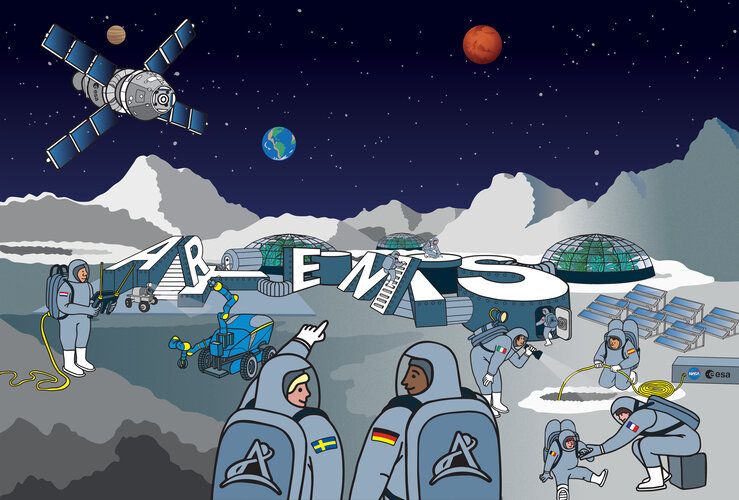Rocket Lab selected by Ball Aerospace to Power NASA's GLIDE Spacecraft
Sunday, 12 June 2022 09:35 Rocket Lab (Nasdaq: RKLB) has been selected by Ball Aerospace to manufacture the Solar Array Panel (SAP) to power NASA's Global Lyman-Alpha Imager of Dynamic Exosphere (GLIDE) mission spacecraft planned to launch in 2025. GLIDE is a heliophysics mission intended to study variability in Earth's atmosphere.
The SAP will utilize SolAero by Rocket Lab's high-efficiency, radiation-hardened, qua
Rocket Lab (Nasdaq: RKLB) has been selected by Ball Aerospace to manufacture the Solar Array Panel (SAP) to power NASA's Global Lyman-Alpha Imager of Dynamic Exosphere (GLIDE) mission spacecraft planned to launch in 2025. GLIDE is a heliophysics mission intended to study variability in Earth's atmosphere.
The SAP will utilize SolAero by Rocket Lab's high-efficiency, radiation-hardened, qua Terran Orbital concludes Fleet Space CENTAURI-5 bus commissioning
Sunday, 12 June 2022 09:35 Terran Orbital Corporation (NYSE: LLAP), a global leader in satellite solutions, primarily serving the United States and Allied aerospace and defense industries, reports that it has completed bus commissioning for the CENTAURI-5 satellite has concluded with nominal health and status checkouts. Tyvak International SRL, Terran Orbital's wholly-owned international subsidiary, designed and built the
Terran Orbital Corporation (NYSE: LLAP), a global leader in satellite solutions, primarily serving the United States and Allied aerospace and defense industries, reports that it has completed bus commissioning for the CENTAURI-5 satellite has concluded with nominal health and status checkouts. Tyvak International SRL, Terran Orbital's wholly-owned international subsidiary, designed and built the Astronomers may have detected a 'dark' free-floating black hole
Sunday, 12 June 2022 09:35 If, as astronomers believe, the death of large stars leave behind black holes, there should be hundreds of millions of them scattered throughout the Milky Way galaxy. The problem is, isolated black holes are invisible.
Now, a team led by University of California, Berkeley, astronomers has for the first time discovered what may be a free-floating black hole by observing the brightening of a
If, as astronomers believe, the death of large stars leave behind black holes, there should be hundreds of millions of them scattered throughout the Milky Way galaxy. The problem is, isolated black holes are invisible.
Now, a team led by University of California, Berkeley, astronomers has for the first time discovered what may be a free-floating black hole by observing the brightening of a NuSTAR marks 10 years studying the X-Ray Universe
Sunday, 12 June 2022 09:35 NASA's Nuclear Spectroscopic Telescope Array (NuSTAR) is turning 10. Launched on June 13, 2012, this space telescope detects high-energy X-ray light and studies some of the most energetic objects and processes in the universe, from black holes devouring hot gas to the radioactive remains of exploded stars. Here are some of the ways NuSTAR has opened our eyes to the X-ray universe over the last d
NASA's Nuclear Spectroscopic Telescope Array (NuSTAR) is turning 10. Launched on June 13, 2012, this space telescope detects high-energy X-ray light and studies some of the most energetic objects and processes in the universe, from black holes devouring hot gas to the radioactive remains of exploded stars. Here are some of the ways NuSTAR has opened our eyes to the X-ray universe over the last d Xenesis signs launch pact with Evolution Space
Friday, 10 June 2022 18:01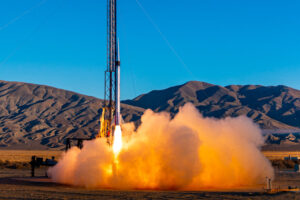
SAN FRANCISCO – Launch startup Evolution Space signed a memorandum of understanding to launch a small satellite constellation for optical communications startup Xenesis. Under the $120 million deal signed in May, Evolution will conduct five suborbital and 25 orbital launches for Xenesis beginning in 2025.
Efforts continue to fully deploy Lucy solar array
Friday, 10 June 2022 15:23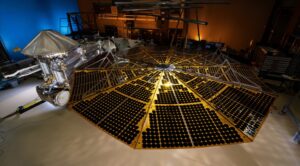
Leaders of NASA’s Lucy asteroid mission are increasingly confident that the mission can continue as planned even if ongoing efforts to fully deploy and latch a solar array don’t succeed.
The post Efforts continue to fully deploy Lucy solar array appeared first on SpaceNews.
Women in simulated space missions demonstrate more sustainable leadership
Friday, 10 June 2022 15:02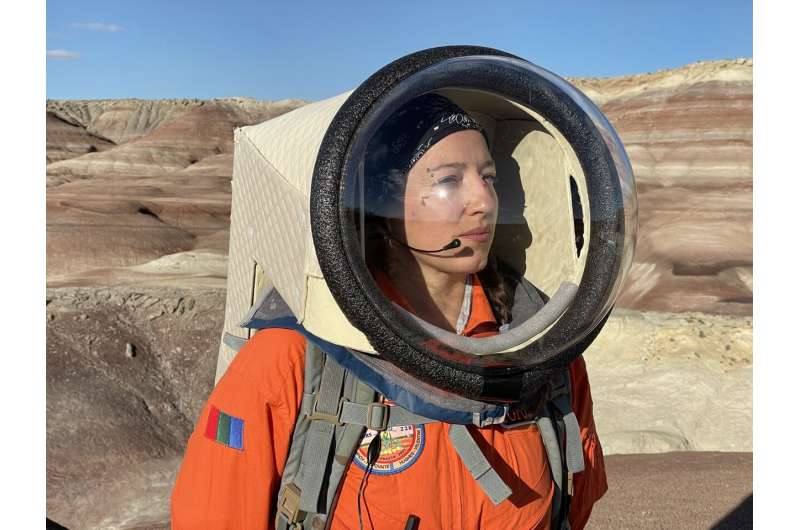
A new study based on Mars Desert Research Station commanders' reports reveals differences in female and male leadership behavior. Although both genders are task-focused, women tend to be more positive. The genders also differ in their approach toward their team—while men focus on accomplishments, women emphasize mutual support. According to the author of the study, Inga Popovaitė, a sociologist at Kaunas University of Technology (KTU) in Lithuania, the findings suggest that women may be better suited for long-term space missions.
According to the researcher, as of 2021, only three women have served as commanders in the International Space Station during two decades of its operations. Although the space is becoming more diverse, little is known about gender differences in leadership in isolated, confined, and extreme environments.
"In 10–20 years when the missions to Mars start, it will be mixed-gender groups that will be sent there. Also, a female astronaut is preparing for a flight to the Moon in a few years.
Week in images: 06-10 June 2022
Friday, 10 June 2022 12:03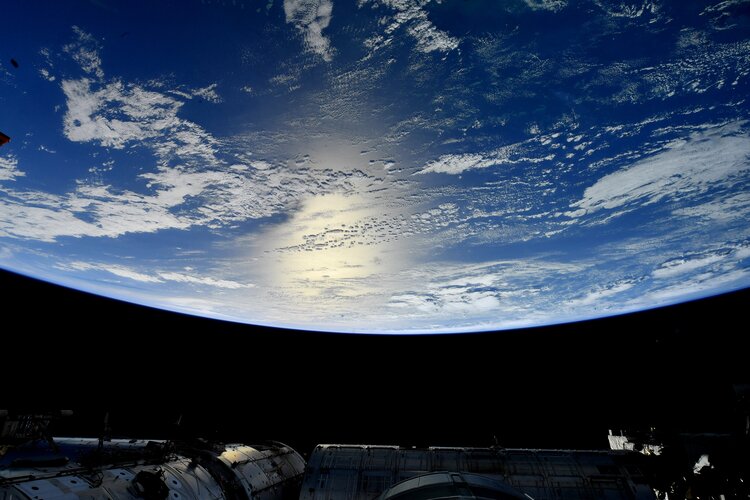
Week in images: 06-10 June 2022
Discover our week through the lens
NASA embraces high-risk, high-reward research with UAP study
Friday, 10 June 2022 10:54
NASA will commission a small independent study of unidentified aerial phenomena (UAP), a move the agency says is part of its desire to support risky research that has the potential for high payoffs.
Asteroid samples contain 'clues to origin of life': Japan scientists
Friday, 10 June 2022 10:52 Asteroid dust collected by a Japanese space probe contains organic material that shows some of the building blocks of life on Earth may have been formed in space, scientists said Friday.
Pristine material from the asteroid Ryugu was brought back to Earth in 2020 after a six-year mission to the celestial body around 300 million kilometres away.
But scientists are only just beginning to di
Asteroid dust collected by a Japanese space probe contains organic material that shows some of the building blocks of life on Earth may have been formed in space, scientists said Friday.
Pristine material from the asteroid Ryugu was brought back to Earth in 2020 after a six-year mission to the celestial body around 300 million kilometres away.
But scientists are only just beginning to di Updating our understanding of Earth's architecture
Friday, 10 June 2022 10:52 New models that show how the continents were assembled are providing fresh insights into the history of the Earth and will help provide a better understanding of natural hazards like earthquakes and volcanoes.
"We looked at the current knowledge of the configuration of plate boundary zones and the past construction of the continental crust," said Dr Derrick Hasterok, Lecturer, Department o
New models that show how the continents were assembled are providing fresh insights into the history of the Earth and will help provide a better understanding of natural hazards like earthquakes and volcanoes.
"We looked at the current knowledge of the configuration of plate boundary zones and the past construction of the continental crust," said Dr Derrick Hasterok, Lecturer, Department o SEAKR Engineering Demonstrates Optical Communications on DARPA's Mandrake 2 Satellites
Friday, 10 June 2022 10:52 SEAKR Engineering, LLC, a wholly-owned subsidiary of Raytheon Technologies, announced a successful demonstration of optical inter-satellite links between two Defense Advanced Research Projects Agency Mandrake 2 satellites. During the first test, more than 280 gigabits of data were transferred at a range of 114 kilometers during a period of more than 40 minutes.
"This was a demonstration no
SEAKR Engineering, LLC, a wholly-owned subsidiary of Raytheon Technologies, announced a successful demonstration of optical inter-satellite links between two Defense Advanced Research Projects Agency Mandrake 2 satellites. During the first test, more than 280 gigabits of data were transferred at a range of 114 kilometers during a period of more than 40 minutes.
"This was a demonstration no DARPA's ANSR to Improving Trustworthy AI
Friday, 10 June 2022 10:52 Despite recent improvements to machine learning (ML) algorithms and assurance technologies, high levels of autonomy still remain elusive.
The reasons for this are twofold. First, data-driven ML lacks transparency, interpretability, and robustness and has unsustainable computational and data needs. Second, traditional approaches to building intelligent applications and autonomous systems th
Despite recent improvements to machine learning (ML) algorithms and assurance technologies, high levels of autonomy still remain elusive.
The reasons for this are twofold. First, data-driven ML lacks transparency, interpretability, and robustness and has unsustainable computational and data needs. Second, traditional approaches to building intelligent applications and autonomous systems th Uncovering a novel way to bring to Earth the energy that powers the sun and stars
Friday, 10 June 2022 10:52 Scientists at the U.S. Department of Energy's (DOE) Princeton Plasma Physics Laboratory (PPPL) have uncovered critical new details about fusion facilities that use lasers to compress the fuel that produces fusion energy. The new data could help lead to the improved design of future laser facilities that harness the fusion process that drives the sun and stars.
Fusion combines light element
Scientists at the U.S. Department of Energy's (DOE) Princeton Plasma Physics Laboratory (PPPL) have uncovered critical new details about fusion facilities that use lasers to compress the fuel that produces fusion energy. The new data could help lead to the improved design of future laser facilities that harness the fusion process that drives the sun and stars.
Fusion combines light element 

